From Spoken Word to Slam Poetry: Performance Poetry Is Everywhere
More and more performance poets are finding their way to the page, while it’s rare for published poets not to perform their work live on stage. In short, performance poetry has become ubiquitous, with spoken word and slam poetry popping up everywhere. How did that happen? Anke Verschueren, a performer herself, could write a book about the subject, but will stick to this personal, exploratory article for now.
There’s language that explains. There’s language that observes and language that ascertains. There’s language that probes, that makes a claim, that explores. There’s language to label something red or green or blue, to point to the saltshaker on the table and ask someone to pass it to you. There’s language that imparts, there’s language that absorbs. There’s language for mapping the mind, language that’s trying to capture a time.
‘Every once in a while, you just have to document something,’ Babs Gons says in my headphones. I’m listening to her, the queen of spoken word (and, until 2025, the Dutch poet laureate), and to Seckou Ouologuem, the godfather of slam poetry (and former Antwerp city poet), in conversation with Kila van der Starre in a podcast about performance literature. Both genres are closely related and share a life on stage and in front of an audience. Yet there are differences too. More about those later. Babs Gons talks about compiling an anthology in 2019 with texts by eighteen Dutch poets whose work had only been performed live up until that point. Her aim had been to make ‘an imprint of time’.
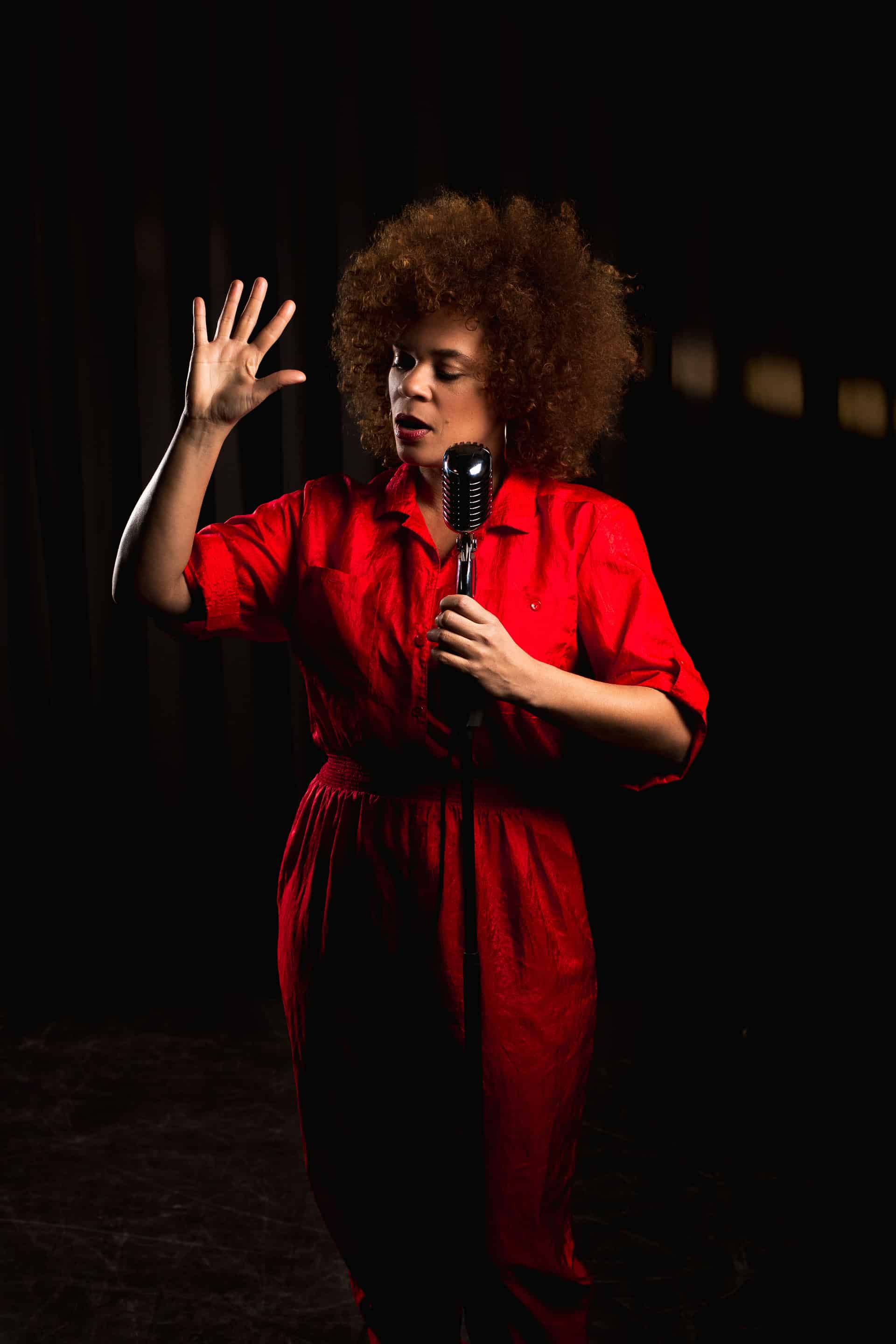 With the publication of 'Ik draag mijn tong in mijn borst', Babs Gons made a brief foray into the landscape of performance poetry.
With the publication of 'Ik draag mijn tong in mijn borst', Babs Gons made a brief foray into the landscape of performance poetry. © Lexie Spiegelreflexie
I nod at the screen, because I agree with her. That imprint is important for giving performance poetry the place in literary history it deserves. But more than getting the lyrics that spoken word artists fire at their audiences to land on the page, we ought to bring an open-minded approach, gentle precision and a flaming pen to their performances, the context in which they take place and the origins and evolution of the genre.
I open a new tab and launch a Google search for publications about the history of spoken word. It’s as if my fingertips sense that they have a better chance of success in English, as they automatically type “history spoken word” into the search box. They were right. I come across the book Stage Invasion: Poetry & the Spoken Word Renaissance by Pete Bearder. He wrote this seminal work about the poetics of the genre, its political and sociological dimensions and its place in literary history almost from the stage itself – it’s the second home for Bearder, who performs as the popular slam poet Pete the Temp. By foregrounding the word ‘renaissance’, he immediately draws our attention to the fact that literature was an oral art form before it moved onto the page. Spoken word is no more, and certainly no less, than a resurgence, a re-evaluation of the way language evolved, long before writing came into the picture.
Writing the history of the present
Within the Dutch-speaking world, it is Babs Gons who has made the first brief foray into the landscape of spoken word poetry with Ik draag mijn tong in mijn borst (I carry my tongue inside my chest). You can follow that journey in the published version of her Abraham Kuyper Lecture in 2022, which was the culmination of her stint as writer in residence at Vrije Universiteit Amsterdam.
It strikes me as difficult to write the history of the present, but when I start reading her booklet, which is freely available online, I’m shocked to realise just how much there is to look back on. Gons opens with the troubadours who are found in all cultures, but also talks about jazz poetry, the Harlem Renaissance, the Beat Poets, The Last Poets and the dub poets, who mounted the stage in the 1920s, 30s, 50s, 60s and 70s respectively with their unique hip-hop, blues, jazz and reggae-inspired work. The Netherlands, too, has a long history of poetry before the footlights, some of it at festivals including Poëzie in Carré (1966), Poetry International (since 1970) and Nacht van de Poëzie (since 1980). For the genesis of poetry slams, however, we have to look to the United States, to a cool jazz club in Chicago in the 1980s, where the music had to momentarily make way for a battle involving poems, judges and audiences.
Gons also writes about having rap music on repeat in her teenage bedroom, about her penchant for language in its most outspoken form and her search for the places where she might find this, in the Netherlands and, further afield, in New York. Returning with a dream, she first picked up a microphone in 1999 and ultimately became the queen of spoken word.
Of course, Gons also talks about the political, emotional, personal and universal, hard and soft power of the performance poet’s language and how it can either embrace something or blow it to smithereens. What her foray doesn’t do is cross the border into Belgium and look at what’s been happening there in recent decades on stages in theatres and cafés, in parks and on squares. Anyone wanting to know how the spoken word scene in Flanders and Brussels started life and went on to thrive is likely to get lost at this moment in time.
An auditory existence
I open a new document and type: this article really wants to be a book.
There’s language that holds and language that lets go. Language that creates space and language that slams shut, language that loses sight of what it was talking about in the first place. There’s language that nurtures other language. Language that limits.
Chapter one of the book that this article aspires to be, a book about the origins and architecture of the spoken word scene in the Dutch-speaking world, could deal with terminology. Seeing eye to eye with your reader about the vocabulary you as an author want to use to talk about something is essential. That’s certainly the case in academic circles: a definition delimits, curbs the imagination, draws a line in the sand. But if I were the one writing this book, I’d take pleasure in keeping as many options open as possible.
For me, spoken word is language that wants to have an auditory existence, on a stage or a recording, with or without music, sounds or beats, with or without rhythm or rhyme, with or without a narrative or formal structure, with or without an activist slant, but nicely crafted, by somebody with a highly personal approach and who knows – or rather, who intuits – why they’re doing it. So as far as I’m concerned, the strong cadences of Hind Eljadid and Marrit Jellema, as well as the light-hearted rhymes of Joke van Leeuwen and Peter Holvoet-Hanssen and the compelling, ultra-linguistic performances by Charlotte Van den Broeck and Moya De Feyter can be described as spoken word. That said, I can imagine that many, perhaps even these poets themselves, have a different take on the matter.
At any rate I agree with myself that spoken word is more of a hypernym, a tree with a trunk, and slam poetry one of its sizable branches – not to be confused with a poetry slam. At least there seems to be consensus about the distinction between these two. A poetry slam is a contest in which poets perform their work on stage, with slam poetry being the work in question, although slamming can also be done before and after or even well away from competition.
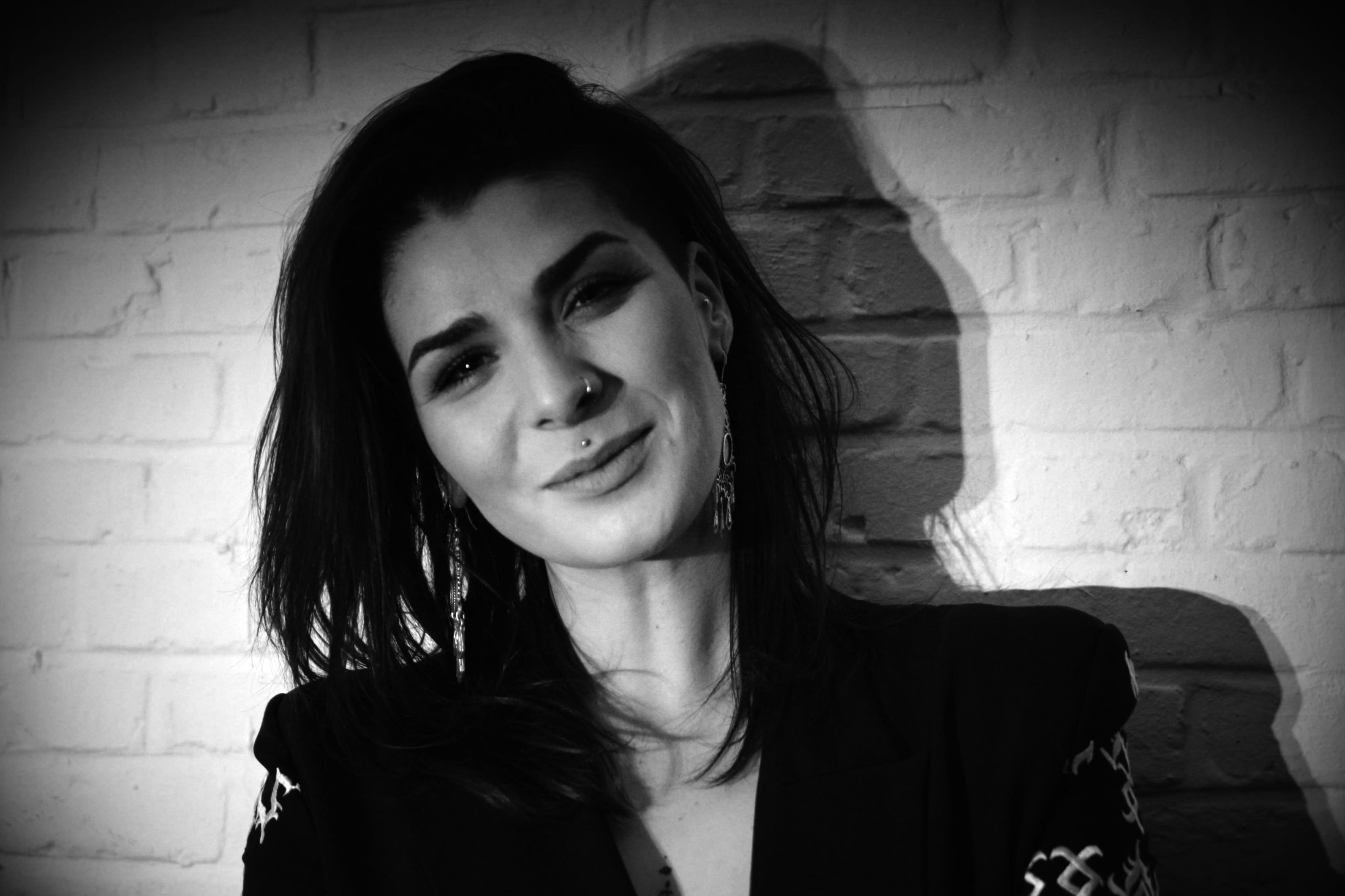 Spoken word can be many things, including the strongly cadenced verses of Hind Eljadid.
Spoken word can be many things, including the strongly cadenced verses of Hind Eljadid.© EPO
Defining slam poetry itself is a bigger challenge. Again, I’m inclined to preface any description with the words ‘for me’. For me, the slam part is significant as we’re dealing with poetry that hits its audience, both in terms of form, with a galloping rhythm that wallops you with words, and content, because the lyrics address a topic that receives too little or too much attention, because they touch something. But even as I’m typing this, I’m having second thoughts, because quiet, hesitant language can pack an equally powerful punch.
From the bookshelf to the coffee table
There’s language that dreams up adventures, that conjures landscapes and soars high in the sky. There’s language that lies. There’s language that throws up a smoke screen. There’s language that whispers and language that howls, language that hits hard in the hope of finally hitting home. There’s language that grieves and language that cheers. There’s language that determines who gets heard.
Can a genre that still warrants a book-length study be considered mainstream? What does that term even mean and above all: who gets to decide whether or not it is? This too deserves a lengthy chapter in that potential tome. If it were up to me, I’d ask Yousra Benfquih or Rashif El Kaoui to write it. Two important, formidable voices who perform their own lyrics while also offering a critical and incisive analysis of the genre and its reception.
Slam poetry hits its audience, both in terms of form, with a galloping rhythm that wallops you with words, and content
For the book Barricadepoëzie. Lyrisch activisme sinds 1848 (Poetry on the barricades. Lyrical activism since 1848, EPO, 2021), Yousra Benfquih wrote an extremely powerful piece about spoken word being a medium for drawing attention to social issues and making them more tangible and relatable for audiences. She also addresses the criticism that’s all too often levelled from within traditional literary circles: spoken word is deemed too loud and too activist, too obvious, with too little room for interpretation, and therefore placed outside poetry. Benfquih argues that this critique blatantly disregards the activist, Afro-American roots of spoken word. Writing about the luxury of abstraction, she references an article by Rashif El Kaoui in Poëziekrant.
Those who aren’t heard let alone believed have no choice but to resort to being explicit and concrete in the hope of getting their message across. Only those who come from a place of privilege and who are part of the dominant social group that listens mainly to itself can afford to be subtle and abstract. On the barricades it’s forceful slogans that do the trick. On the slam poetry stage performers say it like it is.
I personally struggle with terms such as mainstream and marginal. Aren’t they just a question of perspective and a reflection of who has appropriated power? This occurred to me recently as I was memorizing a spoken word text while pacing up and down my living room. All of a sudden I felt as if my oversized bookcase was giving me the side-eye, challenging me even, from the edge of the space, from the wall, the margin. As if it were hissing: ‘So when are you publishing your debut, then?’ I promptly mounted the coffee table and stared right back. And there, in the middle of the room, at the top of my voice and throwing my whole body behind it, I began to rehearse my lyrics.
There’s language that needs money.
The book could also make some space for the financial side of things. It could contain an inventory of the awards that have been launched and given out for spoken word performers in recent years, such as the SPOKEN Awards affiliated with Het Veerhuis in Rotterdam and De Johnny, in recognition of an entire body of work and named after force of nature Johnny van Doorn, aka Johnny the Selfkicker.
Language moves every which way and in every possible direction, permeates and touches everything
We could study what grants have been introduced, what subsidies have been bestowed on poets whose lyrics exist solely in spoken format. In that case, the most honourable mention may well go to Flanders Literature, which since 2024 allows unpublished performance poets to apply for a bursary to work on their literary performance art. In doing so it has filled a gap in a scene that has been fizzing with unrest and frustration for years and it means that a group of writers who have long felt neglected are now finally being taken seriously. Over at the Dutch Foundation for Literature work is also underway to establish a subsidy scheme for non-print creatives.
There’s language that calms and language that goads, language that fans the flames, language that conciliates. There’s language that runs and language that waits. There’s language on tiptoe. There’s language with giant strides. There’s language as cure. There’s language with flair. There’s language that hurtles across a stage. There’s language that dances on the page.
These are the names, the words
The core of the book, and the biggest job for the researcher – let’s get a whole team on it – will consist of mapping, visiting, experiencing and reviewing the many poetry stages and open mics in the Netherlands, Flanders and Brussels. Off the top of my head (a head located in Flanders, and more specifically Antwerp, which wants to apologise for its limited knowledge, geographical blinkers and therefore incomplete list): Mama’s Open Mic, ’Nuff Said, De Sprekende Ezels, You On Stage, Mensen Zeggen Dingen, WeerWoord, Orde Der Dichters, Ballonnenvrees, Dans! Dichter! Dans!, Auw La, De Stroate… and, in caps, MANY, MANY MORE.
I hereby nominate Kevin Amse as head of the research team: his Facebook page is practically a compendium of everything that’s happening in the field of open mics and slams in Flanders and the Netherlands.
The driving forces, those who carry the entire circuit on their shoulders – I see Elisabeth Severino Fernandes, Seckou Ouologuem, Mourad Bekkour, Stijn Vranken, Yannick Moyson, Yves Kibi Puati Nelen and Gert Vanlerberghe flash before my eyes – will have to be interviewed: about their passion and what sparked it, about the artists, audiences and stages they’ve experienced and seen evolve over the years.
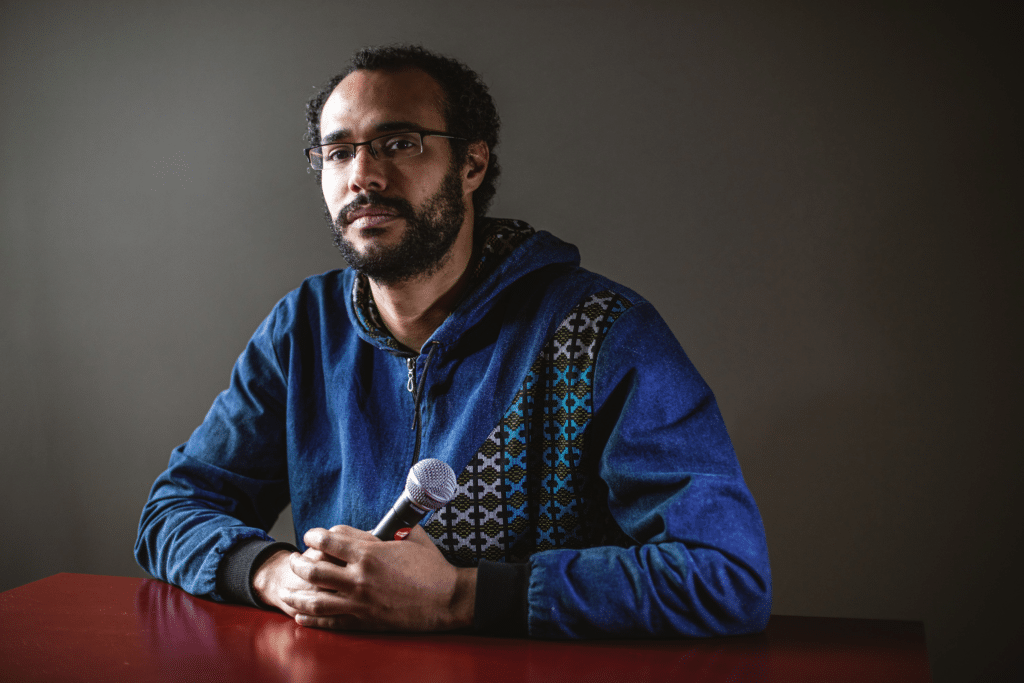 Seckou Ouologuem is the godfather of slam poetry in Flanders and a former Antwerp city poet.
Seckou Ouologuem is the godfather of slam poetry in Flanders and a former Antwerp city poet.© Iedereen Leest / Michiel Devijver
It goes without saying that we’ll also have to hear from a whole horde of slammers and spoken word performers without whom the genre wouldn’t exist in the first place. They’re there, in great numbers and all totally unique; I won’t even attempt to list them here. In an ideal scenario, their lyrics would be artistic intermezzos, QR codes on beautifully designed pages to scan and listen to between chapters. And those lyrics will be printed as well – to read, yes, that too is something we need to talk about.
And by that I mean: the relationship between performance literature and printed literature and how the latter seems to be gradually losing its status as the greatest possible good for a poet. This assertion is mostly based on my own gut feeling and the previously mentioned introduction of bursaries for performance literature in Flanders. That said, I’m also under the impression that it’s been very much a case of two-way traffic in recent years.
First off, there’s the road from stage to page. It’s simple arithmetic. What percentage of the avid spoken word poets find their way to a reputable publishing company? It’s also important to look beyond this and take a qualitative look at the issue. How does one go about finding a suitable imprint? To what extent do performance poets modify their work for publication? Who would like to enlist a publisher but does not get around to it, who is rejected and why and how?
In 2017 Kila van der Starre wrote a review article about poetry slams in the Netherlands and Flanders for Kunsttijdschrift Vlaanderen. In it, she argued that the slam communities in these two areas are quite distinct, partly because the Dutch competitions often help poets graduate from stage to page, whereas Belgian performance poets tend to remain loyal to the boards. I’d love to take a closer look at these trends in 2024. The first thing that springs to mind is Tussentaal, the debut collection of the Flemish Esohe Weyden. The blurb boldly asserts: ‘Spoken word comes to life on the pages of Tussentaal.’
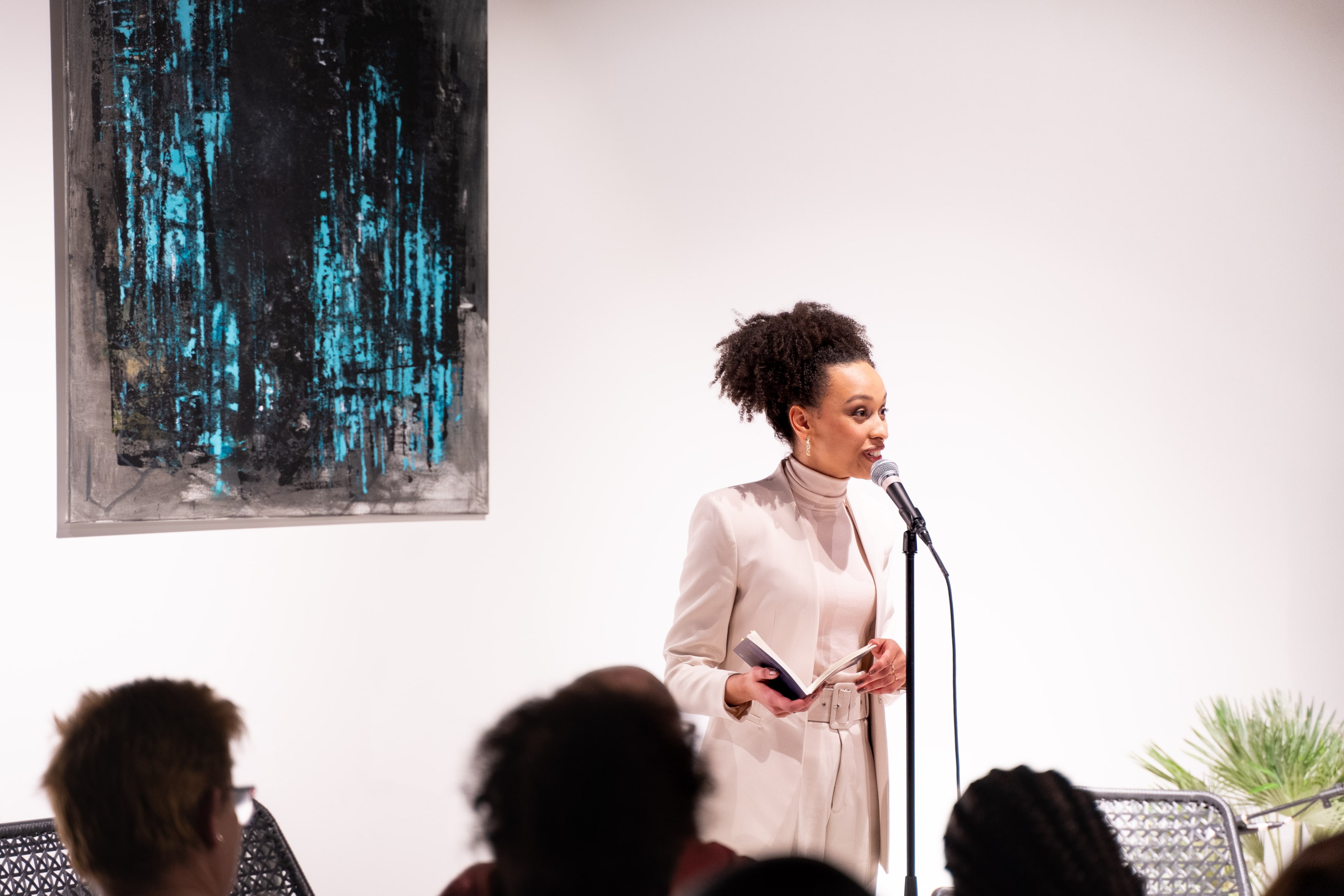 The blurb of Esohe Weyden’s debut collection asserts: ‘Spoken word comes to life on the pages of Tussentaal’.
The blurb of Esohe Weyden’s debut collection asserts: ‘Spoken word comes to life on the pages of Tussentaal’.© Jonathan Ramael
So what about the other path, from page to stage? I don’t know if it’s still possible in this day and age for a poet to publish their poetry and not perform it live. I’ve noticed that these performances receive both more space and attention nowadays, that they’re becoming a more integral part of the collection itself. The most notable example may well be Oerhert, the debut that earned Astrid Haerens the Poëziedebuutprijs as well as various nominations and that’s now also a frequently staged performance together with two talented musicians.
And then of course there’s the language that moves every which way and in every possible direction, that permeates and touches everything. Spoken word pops up more and more often, in all kinds of contexts. On festival stages (think of the segment by Elisabeth Lucie Baeten at 505 – Concerten voor de Menselijkheid in Antwerp), in Instagram reels and TikToks (such as the gorgeous audio-visual poems by Billie Vos), while even radio commercials feature rhythmic rhyming that isn’t rap (by voice actor Koen De Graeve, for instance). Within literature itself, the languages of stage and page undoubtedly cross-pollinate each other too, although that’s difficult for me to gauge without a closer look.
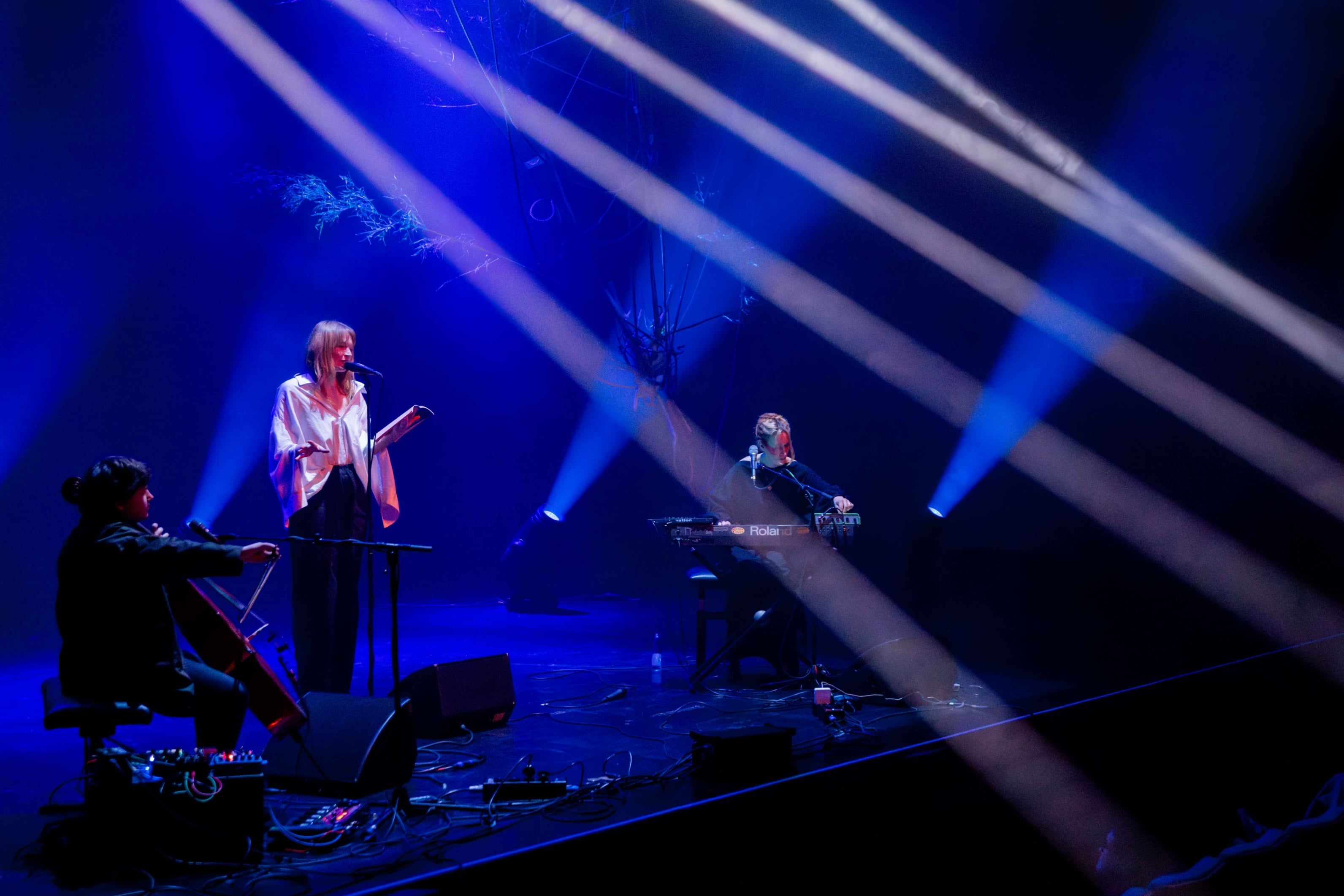 Is it possible in this day and age to publish your poetry and not perform it live? Astrid Haerens’ collection Oerhert has become a frequently staged musical performance.
Is it possible in this day and age to publish your poetry and not perform it live? Astrid Haerens’ collection Oerhert has become a frequently staged musical performance.© Jonas Verbeke
Perhaps my only yardstick at the moment is myself. Here and now. Because while writing this text I can’t help but notice that my sentences are suffused with rhythm, that I have to almost stop myself from rhyming too much, that I’m gesticulating even while typing, that I’ve been silent long enough and sometimes pause halfway through a sentence to say it out loud so I can hear instead of see where it wants to go. I suggest you try it sometime.
There’s language. Everywhere.













Leave a Reply
You must be logged in to post a comment.